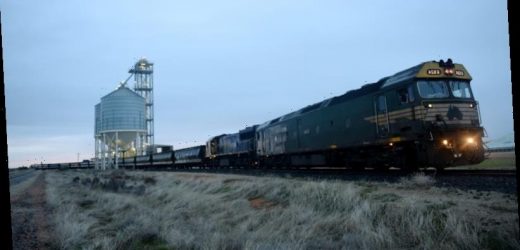Victoria has delivered a bumper grain harvest but farmers in the state’s north-west say an over-budget rail upgrade project has left behind an outdated freight system that is hampering the transport of goods and forcing thousands more trucks onto the roads.
The farmers have accused the state government of backing down on a promise to standardise the Murray Basin rail system.
The Murray Rail project was intended to upgrade rail transport in Victoria’s west.Credit:Pat Scala
The grain-growing communities of Manangatang and Sea Lake sit on broad-gauge freight train lines, which means there is a greater distance between the train tracks than for the more commonly used standard gauge. The state government previously sought to standardise the century-old rail lines as part of the Murray Basin rail project, but now concedes it won’t deliver that commitment, infuriating farmers in the region.
The cost of the project, which has been funded by both the state and federal governments, has blown out significantly from the original $440 million price tag.
The upgrade was supposed to standardise 1000 kilometres of track, but it was only partially completed in 2019 when funding ran out.
The Commonwealth kicked in another $200 million late last year, including $5 million for additional planning to fully standardise the Murray Basin rail network, including the Sea Lake and Manangatang lines. The total cost of the project has now exceeded $800 million.
Manangatang crop farmers Christine Plant and Brian Barry jnr say the state government has broken a promise by refusing to standardise their local freight rail line. Credit:Jason South
Victorian government owns the train lines and is responsible for carrying out the project.
Victorian Farmers Federation grains group president Ashley Fraser said the huge harvest meant thousands of extra trucks were hitting the roads and would continue doing so into the Easter break.
He said grain-rich areas such as Manangatang and Sea Lake were forced to either rely on the sluggish and ageing broad-gauge infrastructure or send their harvest by road.
“With the rest of the nation moving to a standard rail gauge, it seems ridiculous that the state government would lock the Sea Lake line into an obsolete 19th-century rail system,” Mr Fraser said.
But the Victorian government argues a recent business case review found improvements could be made by enhancing existing broad- and standard-gauge lines.
A spokeswoman said the government understood the importance of the Murray Basin rail network and a “revised package of works” would deliver more efficient freight movements.
“We’re investing in what the industry highlighted as the key current issues – speed, reliability and axle load,” she said.
The spokeswoman said total investment reached more than $800 million, but that would not include full standardisation.
Christine Plant at her farm in Manangatang. Credit:Jason South
“Further standardisation would require significant investment, extensive construction in the Ballarat corridor and disruptions to Ballarat line passenger services and will not deliver key benefits originally promised.”
Manangatang grain farmer Christine Plant, whose business relies predominantly on trucks, said she would consider using rail if it was standardised and affordable.
“We would prefer to use rail because it is more environmentally friendly, more sustainable and it is better for roads and communities to have fewer trucks on the road,” she said.
Rail Futures Institute president John Hearsch said Victoria’s freight rail system was a patchwork of broad and standard gauges.
He said trains had to travel as slowly as 25km/h on some sections of the Manangatang line because of their poor condition, making rail a far less attractive option than road.
“I think the farmers are justified in being a bit aggrieved,” he said.
Mr Hearsch maintained farmers on the Sea Lake and Manangatang lines faced substantial limitations in transporting grain interstate because they were stuck with broad-gauge tracks that were incompatible with other states.
Although this problem was not common, he said, it had disadvantaged local farmers when NSW and Queensland were in drought and required Victorian grain.
Victoria’s winter crop production for 2020-21 is forecast to increase by 27 per cent to 9.5 million tonnes, according to a report prepared by the Australian Bureau of Agricultural and Resource Economics and Sciences.
Manangatang farmer Brian Barry said much of the wheat, barley and lentils produced on his farm were transported by truck, but he would prefer to send more by rail.
Mr Barry said farmers watched in frustration when the government announced multibillion-dollar upgrades to Melbourne’s rail system while the Murray Basin project was incomplete.
“It’s just so disappointing. We’re all Victorians, and they need to look after all of us,” he said.
The Nationals MP for Mallee, Anne Webster, implored the state government to deliver full standardisation of the Sea Lake and Manangatang lines.
Start your day informed
Our Morning Edition newsletter is a curated guide to the most important and interesting stories, analysis and insights. Sign up here.
Most Viewed in National
Source: Read Full Article





